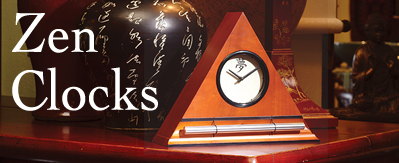
Choose The Zen Alarm Clock - for a Gentle, Progressive Awakening
Sleep deprivation is a little known, but serious national problem.
So believes Dr. William Dement, M.D., Ph.D., considered the world’s leading authority on sleep, sleep deprivation and the diagnosis and treatment of sleep disorders.
A groundbreaking pioneer in the early days of sleep research, Dement is an outspoken advocate for sleep awareness as a cure for what he calls a “sleep-sick society.” He recently authored a book, “The Promise of Sleep”, a comprehensive overview of what happens when we sleep, its effect on overall health, and the dangers of sleep loss and deprivation.
Still active in the field at age 71, Dement draws upon four decades of experience as a dedicated scientist, sleep doctor, and clinic and laboratory administrator. He is the founder and director of the Stanford Sleep Disorders Center, the world’s first sleep disorders center, where people continue to seek treatment, and research is ongoing.
His book is a definitive guide to sleep and what he calls its “vital connection between health and happiness.” Co-written with Christopher Vaughan, the 540-page book covers everything from the definition of sleep and history of sleep and sleep disorder research, to chronic disorders and treatments.
Dement explores the connection between sleep and physical and mental well-being, presents insightful background on dreams – one of his early interests, and offers a step-by-step guide to help people take personal stock of their sleep needs at any age. Readers will also find useful information about the variety of disorders that exist and their definitions, and a listing of sleep center locations by state and sleep-related Web sites.
“Sleep deprivation is an across-the-board problem. But society is completely ignorant about sleep. It’s time people wake up and move sleep education into the mainstream,” said Dement, whose expertise is frequently sought.
Some of the world’s biggest catastrophes can be linked, in part, to sleep deprivation, incidents such as the Three-Mile Island nuclear event, Exxon Valdez oil spill, and even the Challenger shuttle explosion. “These events happened because someone fell asleep,” said Dement.
“In a recent survey by the National Sleep Foundation, 23 percent of people polled admitted to falling asleep while driving,” Dement writes in his book. “With this mind, it should come as no surprise that sleep deprivation plays a major role in most accidents labeled “cause unknown,’ or that an estimated 24,000 people die each year in accidents caused directly or in part by falling asleep at the wheel. Almost all of us, regardless of our formal education, are dangerously misinformed about drowsy driving and its causes.”
Dement serves as chairman of the National Commission on Sleep Disorders Research, whose report led to creation of the National Center on Sleep Disorders Research – a new agency within the National Institutes of Health.

Choose A Soothing Alarm Clock - Sleep deprivation is a little known, but serious national problem.
In 1992, the commission’s report to Congress, “Wake Up America: A National Sleep Alert” urged more federal funding for sleep research, and a campaign of public awareness about the nature and impact of sleep disorders, calling sleep deprivation “a national emergency.”
Dement in 1975 launched the American Sleep Disorders Association and served as president for a dozen years. He teaches a popular “Sleep and Dreams” course at Stanford and wrote the first undergraduate textbook in the field.
“People don’t realize that sleep loss piles up like a debt. People think that sleep debt goes away, but it only gets bigger,” said Dement, who continues to address the problem before civic and business groups, governmental bodies and health professionals across the country.
“I’m sounding the alarm in every way I can.”
Waking up in the morning should be as pleasant as falling asleep at night. The Zen Alarm Clock’s gradual, gentle awakening is transformative.
Boulder, Colorado—an innovative company has taken one of life’s most unpleasant experiences (being startled awake by your alarm clock early Monday morning), and transformed it into something to actually look forward to. “The Zen Alarm Clock,” uses soothing acoustic chimes that awaken users gently and gradually, making waking up a real pleasure.
Rather than an artificial recorded sound played through a speaker, the Zen Clock features an alloy chime bar similar to a wind chime. When the clock’s alarm is triggered, its chime produces a long-resonating, beautiful acoustic tone reminiscent of a temple gong. Then, as the ring tone gradually fades away, the clock remains silent until it automatically strikes again three minutes later. The frequency of the chime strikes gradually increase over ten-minutes, eventually striking every five seconds, so they are guaranteed to wake up even the heaviest sleeper. This gentle, ten-minute “progressive awakening” leaves users feeling less groggy, and even helps with dream recall.
adapted from sfgate.com by Elaine Larson

The Zen Alarm Clock Shop - Boulder, CO
Now & Zen – The Zen Alarm Clock Shop

The Zen Alarm Clock Showroom - Boulder, CO - orders@now-zen.com
1638 Pearl Street
Boulder, CO 80302
(800) 779-6383
orders@now-zen.com
Posted in Bamboo Chime Clocks, sleep, Sleep Habits